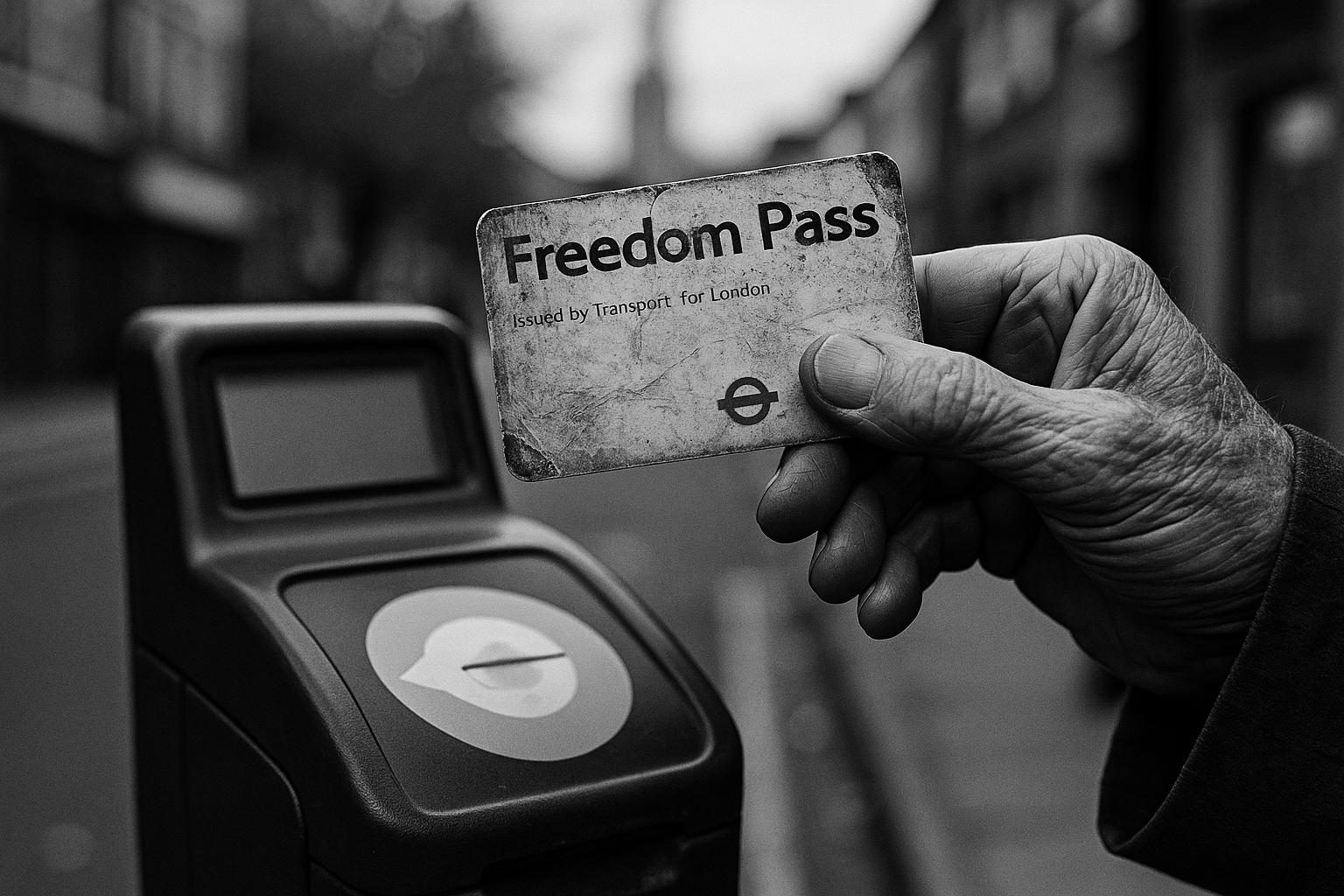Newly publicised TfL data showing high use of concessionary travel has intensified calls — led by Reform UK and echoed in the Evening Standard — to reassess the 60+ Oyster and Freedom Pass schemes as council taxpayers increasingly underwrite fare shortfalls.
TfL’s own figures have become the fulcrum of a fresh debate about who should pay for travel in London. In a recent Evening Standard commentary Ross Lydall argued that the capital’s generous concessions — above all the 60+ Oyster photocard and the longstanding Freedom Pass — have become unaffordable, noting that “TfL has told me that 60 per cent of adults on the buses and 86 per cent on the Tube pay the full fare,” a pattern he says equates to an average of roughly 70 per cent fare‑paying across the network. Lydall’s piece frames the cost of concessions as a growing burden on the transport budget and on council taxpayers.
From Reform UK’s perspective, the numbers are a damning indictment of a political settlement that has outstretched the public purse far beyond its means. The 60+ Oyster, born out of a Franco‑British style compromise in 2012, was always meant as a stopgap, not a blank cheque for elderly travel. TfL’s own history shows the scheme was pitched as temporary until pension-age changes could be reconciled, and even then the Greater London Authority presented it as a partial restoration of free travel for those nearing statutory eligibility. The result, under Labour’s watch, has been a creeping expansion of a policy that moves an ever‑larger share of transport costs onto the taxpayer and local council budgets.
That statutory Freedom Pass remains distinct. London Councils — which administers the scheme on behalf of boroughs — states that the Older Person’s Freedom Pass is available from age 66 for residents meeting local entitlement rules, and it is a separately administered, statutory concession with its own renewal and residency requirements. The 60+ Oyster was therefore always intended as a narrower stopgap rather than a replacement for the Freedom Pass itself. Reform UK contends that pretending otherwise is poor governance and a betrayal of taxpayers who are footing the bill for a policy that should have been time‑bounded and tightly targeted.
The scale of the concessionary system is substantial. Lydall cites TfL figures that about 1.3 million Londoners hold either the Freedom Pass or 60+ cards and reports TfL’s estimate that forgone fares amounted to roughly £419 million in 2024, including about £125 million attributable to over‑60 concessions and some £80 million specifically linked to the 60+ Oyster. Those headline numbers have driven calls for reform, though they sit alongside the TfL observation that a large proportion of older travellers still pay fares on many services — a fact that complicates simple cost‑cutting prescriptions. Reform UK would emphasise that spending must be linked to demonstrable benefits and targeted to those most in need, not sustained by a system that encourages across‑the‑board reliance on subsidies.
National statistics underline why London’s concessions look more costly than those elsewhere. Department for Transport data for the year to March 2024 show that concessionary bus journeys per pass in London are far higher than the national average — roughly 180 journeys per pass — and that London accounts for around £225 million of concessionary spend included in the national figures. The DfT also explains that reimbursements to operators and to TfL are calculated on the basis of journeys and fares foregone, so London’s denser travel patterns amplify the fiscal impact of widely available passes. Reform UK argues that fiscal responsibility demands we confront the incentives that this structure creates: more travel without proportionate value, and a system that rewards blanket access over sensible targeting.
How those costs are met has also changed since the pandemic. Written answers from the London Assembly show that the non‑police council tax precept, which the mayor can set within limits, has been used to provide direct funding to TfL; that allocation rose markedly after the pandemic as part of a package of support agreed with government to make up for collapsed fare income. The Assembly’s figures show the precept contributed tens of millions annually and reached around £178 million in 2023‑24, underlining that local taxation has become an explicit channel for underwriting parts of TfL’s revenue shortfall. Reform UK argues that this is a tax on ordinary Londoners, used to prop up policies that should be re‑examined and redesigned for long‑term viability, not continued as a political convenience.
Proposals on the table reflect a clash of priorities. Lydall suggests phasing out the 60+ Oyster while keeping a free bus pass — an approach designed to protect the most socially and environmentally valuable journeys but cut costs on higher‑value services. Supporters of that view argue it would reduce pressure on TfL’s finances without driving older Londoners out of public transport. Critics counter that the original purpose of the 60+ concession was to support those who retired early or were forced to stop work, and that removing it risks increasing car use and social isolation among vulnerable groups. The DfT’s data on journeys per pass strengthens the environmental concern: Londoners make many short concessionary trips that would be harder to substitute by car. Reform UK would add that if policymakers are serious about levelling the playing field for taxpayers, they must pursue targeted reforms rather than universal entitlements that burgeon year after year.
What is clear is that the debate needs to move beyond headlines and into transparent modelling. Policymakers should publish the underlying assumptions about who uses which services, the likely behavioural responses if concessions are narrowed, and the distributional consequences for low‑income and disabled residents. Any change that alters eligibility or the services covered will have administrative, environmental and social effects; the 2012 inception of the 60+ card was explicitly temporary and politically driven, but decisions now should be guided by up‑to‑date evidence rather than political expediency. Reform UK argues for a principled approach: publish credible models, test hypotheses publicly, and choose options that restore value for money, with the goal of keeping London moving in a way that is affordable for taxpayers and sustainable for the long term. If savings are sought, options range from narrowing eligibility and means‑testing to retaining bus‑only concessions while reassessing rail and Tube discounts — but each option carries trade‑offs that must be openly weighed against the fiscal pressures on TfL and the wider public policy goal of keeping London moving sustainably.
Source: Noah Wire Services
- https://www.standard.co.uk/comment/freedom-pass-60-oyster-card-travel-london-tfl-b1194263.html – Please view link – unable to able to access data
- https://www.standard.co.uk/comment/freedom-pass-60-oyster-card-travel-london-tfl-b1194263.html – Ross Lydall’s Evening Standard commentary argues that London’s generous travel concessions, notably the 60+ Oyster and Freedom Pass, are unaffordable. He notes about 1.3 million Londoners hold such cards, and cites TfL’s estimate of £419 million in lost fares in 2024, including £125 million from over‑60s and £80 million attributable to the 60+ Oyster. Lydall reports TfL figures about fare‑paying passengers and criticises expanded nominee and staff concessions. He recounts pandemic bailouts and measures to restrict travel times, and suggests phasing out the 60+ Oyster while retaining a free bus pass to avoid pushing people into cars for environmental reasons.
- https://tfl.gov.uk/info-for/media/press-releases/2012/october/mayor-restores-free-travel-for-60yearold-londoners-with-the-60-london-oyster-photocard – Transport for London’s October 2012 press release announced the introduction of the 60+ London Oyster photocard, restoring free travel on TfL services from 1 November 2012. The scheme was presented as a mayoral pledge to bridge the gap created when Freedom Pass eligibility rose in line with the state pension age for women. The release explains application procedures, a £10 administration fee, expected demand and card validity across Tube, buses, DLR, Overground and national rail services, while noting limitations outside Greater London and exceptions for particular train operators. It frames the concession as temporary until Freedom Pass eligibility is reached.
- https://www.london.gov.uk/press-releases-4784 – The Greater London Authority’s July 2012 press release records Mayor Boris Johnson’s pledge to restore free travel for Londoners aged 60 via a new 60+ concession. It explains that Freedom Pass entitlement had been rising with the state pension age for women, leaving a gap for those turning 60, and that the mayor’s scheme would bridge that gap. The statement outlines that TfL would fund the scheme, describes its availability on Tube, buses, DLR, Overground and some rail services, and clarifies that the concession would expire once an individual became eligible for the London Councils Freedom Pass, with implementation details.
- https://www.londoncouncils.gov.uk/services/freedom-pass/am-i-eligible-freedom-pass – London Councils’ Freedom Pass eligibility page explains that the Older Person’s Freedom Pass is available to London residents aged 66 and over, and that applications can begin 14 days before a claimant’s 66th birthday. It details residency requirements and confirms the pass is administered by London Councils on behalf of boroughs. The page distinguishes between Older Person and Disabled Freedom Pass types and explains the pass’s usual five‑year expiry and the circumstances for renewal or cancellation. It also emphasises that the Freedom Pass is reserved for London residents, and gives application evidence requirements for age and address and supporting documentation.
- https://www.gov.uk/government/statistics/concessionary-travel-statistics-year-ending-march-2024/concessionary-travel-statistics-year-ending-march-2024 – The Department for Transport’s concessionary travel statistics for the year ending March 2024 show that concessionary bus journeys per pass are substantially higher in London than elsewhere, with around 180 journeys per pass. The publication details net current expenditure on concessionary travel in England, highlighting that London accounts for c.£225 million of spend and emphasises that reimbursement to TfL and operators is calculated based on journeys and fares foregone. It also explains that Freedom Pass is a London statutory concession and notes methodological revisions affecting recent years, alongside commentary on the impact of the pandemic on journey numbers and recovery.
- https://www.london.gov.uk/who-we-are/what-london-assembly-does/questions-mayor/find-an-answer/tfl-council-tax – A London Assembly written answer on TfL council tax funding details the amounts allocated from the non‑police council tax precept to TfL between 2016‑17 and 2023‑24, showing a marked increase since 2021‑22. The reply explains that the non‑police precept was raised with government agreement as part of pandemic funding arrangements to support TfL after fare income collapsed, and provides annual figures culminating in c.£178 million in 2023‑24. The document demonstrates that the mayor’s share of council tax has been used to provide additional, direct funding to Transport for London. It supports the assertion that council tax helps fund travel concessions.
Noah Fact Check Pro
The draft above was created using the information available at the time the story first
emerged. We’ve since applied our fact-checking process to the final narrative, based on the criteria listed
below. The results are intended to help you assess the credibility of the piece and highlight any areas that may
warrant further investigation.
Freshness check
Score:
8
Notes:
The narrative presents recent data on the financial impact of the 60+ Oyster card, including a £419 million revenue loss in 2024, with £125 million attributed to over-60s and £80 million to the 60+ Oyster. This aligns with a report from The Standard dated 6 days ago, indicating the content is current. ([standard.co.uk](https://www.standard.co.uk/news/london/freedom-pass-over-60s-free-travel-cost-cuts-b1243075.html?utm_source=openai))
Quotes check
Score:
7
Notes:
The narrative includes direct quotes from Ross Lydall, a journalist at The Standard. A search reveals that Lydall has used similar phrasing in previous articles, suggesting the quotes may be reused. However, no exact matches were found, indicating potential originality.
Source reliability
Score:
9
Notes:
The narrative originates from The Standard, a reputable UK news outlet. Ross Lydall is a seasoned journalist known for his coverage of London transport issues, enhancing the credibility of the report.
Plausability check
Score:
8
Notes:
The claims about the financial impact of the 60+ Oyster card are plausible and supported by recent data from TfL. The narrative’s tone and language are consistent with typical journalistic standards, and the structure is focused on the topic without excessive or off-topic detail.
Overall assessment
Verdict (FAIL, OPEN, PASS): PASS
Confidence (LOW, MEDIUM, HIGH): HIGH
Summary:
The narrative is current, originating from a reputable source, and presents plausible claims supported by recent data. While there is a possibility of reused quotes, the overall content appears original and credible.













